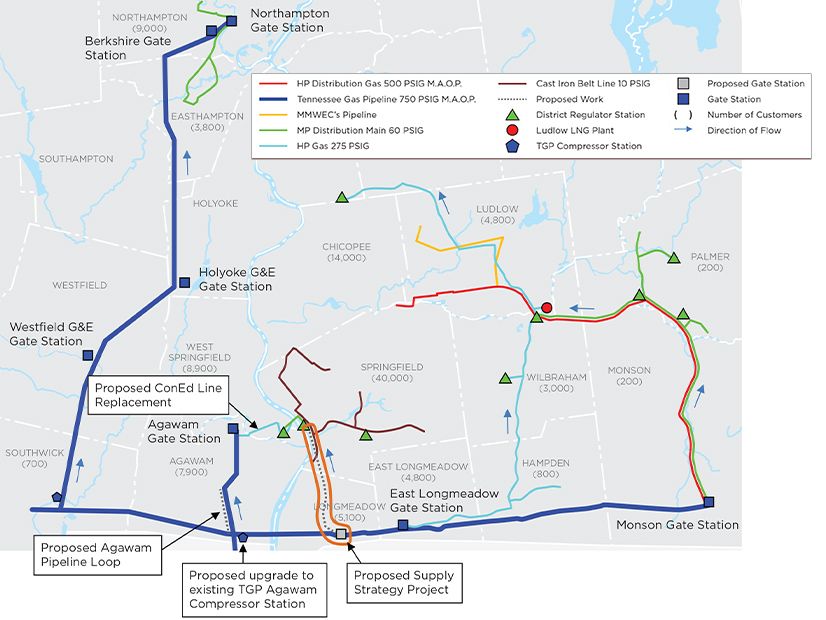The D.C. Circuit Court of Appeals on Friday handed more fuel to FERC’s Democratic majority for its new policies on natural gas infrastructure, ruling that the commission has to take another shot at reviewing downstream greenhouse gas emissions from a Massachusetts compressor project.
The court granted a petition for review and remand from Food & Water Watch, which had challenged FERC’s approval of a project by Tennessee Gas Pipeline to upgrade a compressor station in Agawam, Mass.
“The commission’s environmental assessment failed to account for the reasonably foreseeable indirect effects of the project — specifically, the greenhouse gas emissions attributable to burning the gas to be carried in the pipeline,” Judge Sri Srinivasan wrote in the court’s opinion.
The environmental group had argued that FERC’s decision failed to comply with the National Environmental Protection Act in four ways, and the court agreed with one of those arguments: that FERC failed to adequately consider the effects of the emissions associated with the consumption of the gas that the project would carry.
The commission had asked for data from Tennessee Gas, and the pipeline company provided them, but FERC found the information was “too generalized” to estimate downstream emissions at all, an argument which the court rejected.
The court relied heavily on its 2017 decision in Sierra Club v. FERC, better known as “Sabal Trail,” a similar case in which the Sierra Club challenged FERC’s approval of three pipelines in the Southeastern U.S.
“Our decision in Sabal Trail points the way to concluding that the available information was sufficiently specific to render downstream emissions reasonably foreseeable,” Srinivasan wrote.
The court ordered FERC to “perform a supplemental environmental assessment in which it must either quantify and consider the project’s downstream carbon emissions or explain in more detail why it cannot do so.”
Well Timed for Glick
The ruling will fit neatly into the argument that FERC Chairman Richard Glick has been making around his decision to revamp the commission’s pipeline approval process to more closely consider emissions, which has been challenged by Republicans and even some Democrats in Congress.
In a Senate hearing just days before the latest ruling, Glick pointed specifically to the D.C. Circuit’s past opinions to defend his move to update FERC’s policy statement governing natural gas infrastructure certificates. (See Glick: No Regrets over Gas Policy Statements.)
“The D.C. Circuit has spoken on several occasions, and unless the court’s interpretation is reversed, we have no choice but to follow with unambiguous guidance,” Glick said.
The changes “will lead to project orders that are more legally durable,” he added.
Things Left Unsaid
The ruling notably did not take a position on the “significance” of downstream emissions, but only whether FERC has a duty to tally them.
“We see nothing that provides any view on whether FERC has the authority to require mitigation of those emissions as a general matter,” ClearView Energy Partners wrote in its analysis of the ruling. “Since FERC did not make a call on significance in this case, and the petitioner failed to properly raise it, this case provides no incremental insight into this issue.”
The court also didn’t shed any light on the assessment of upstream emissions or the use of the social cost of carbon, so those will have to be adjudicated in future cases. “Those fights still lie ahead,” ClearView wrote.
Reactions
“Today’s decision adds to a growing list of cases affirming that FERC is required to consider these climate impacts,” said Sarah Ladin, an attorney at the Institute for Policy Integrity at the New York University School of Law.
“More broadly, today’s decision affirms that the commission’s new policy statement is an appropriate action to ensure it properly considers greenhouse gas emissions in assessing pipeline applications,” Ladin wrote in a statement.
Gillian Giannetti, a senior attorney at the Natural Resources Defense Council, wrote that FERC’s work on the Agawam project was the “kind of shoddy review that FERC aims to correct in updating its policy statements.”
“It doesn’t benefit anyone for FERC to lose over and over and over on this issue,” she tweeted.



